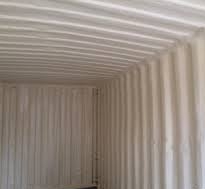Did you know that spray foam is not only a good insulator but is also a good sound proofing and acoustic insulation material. It is able to be used for other purposes such as protecting your home against pests. In comparison to other insulators, spray foam is one of the most efficient acoustic barriers for this purpose.
How Does Spray Foam Work?
Spray foam acoustic barrier is a simple to apply compound that is widely used for soundproofing and insulation. It is comprised of two different compounds. On mixing the two chemical compounds react together creating a foam which is then sprayed onto the surface area you wish to soundproof or insulate. The foam when applied expands into all the cracks and crevasses forming a acoustic barrier seal. The spray then quickly dries and hardens, consequently forming a durable insulating and soundproofing seal on the surface area. Once cured this foam ends up as a complete inert foam.
What Is The Best Foam to Use for Acoustic Insulation?

Just about all types of spray foam obtainable today can help in reducing noise by providing an acoustic insulation barrier. Both open or closed cell spray foam can be used. Closed cell is more effective but is more expensive. To make a decision on which and where the spray will be most effective for soundproofing, think of the area you wish to soundproof and how it is positioned relative to the rest of the building. The way that spray foam helps to soundproof an area is that it stops air transfer and vibration from one room to the next. By stopping air, the insulation stops the means that sound travels (air) plus cushions any vibration of the material the foam is applied to, thus aiding in noise reduction.
If not sure just what spray foam is right for you? You should get advice from experts like us at “SprayFoam Solutions” They will be able to advise you on your requirements to fit your particular application. You can phone them or fill in the “Contact Form“.
While traditional types of soundproofing are not as sound absorbent, spray foam products with semi-rigid open cells are able to take in sound waves that of varying frequency levels. Foam acoustic insulation can assist rooms and structures attain a Sound Transmission class of 50 or greater. In comparison, rooms with conventional soundproofing typically achieve a sound rating 27 and 34. You can read more about sound transmission at http://en.wikipedia.org/wiki/Sound_transmission_class.
So if you suffer from noise you should consider a sound barrier such as Foam Insulation that will provide for the acoustic insulation you need.